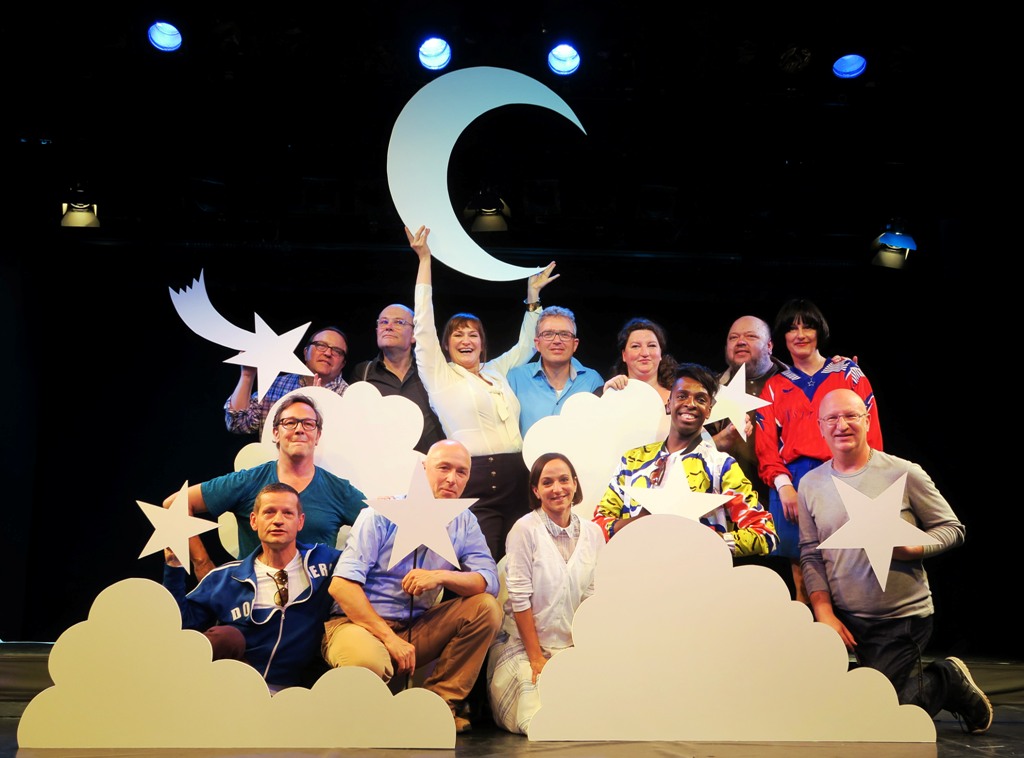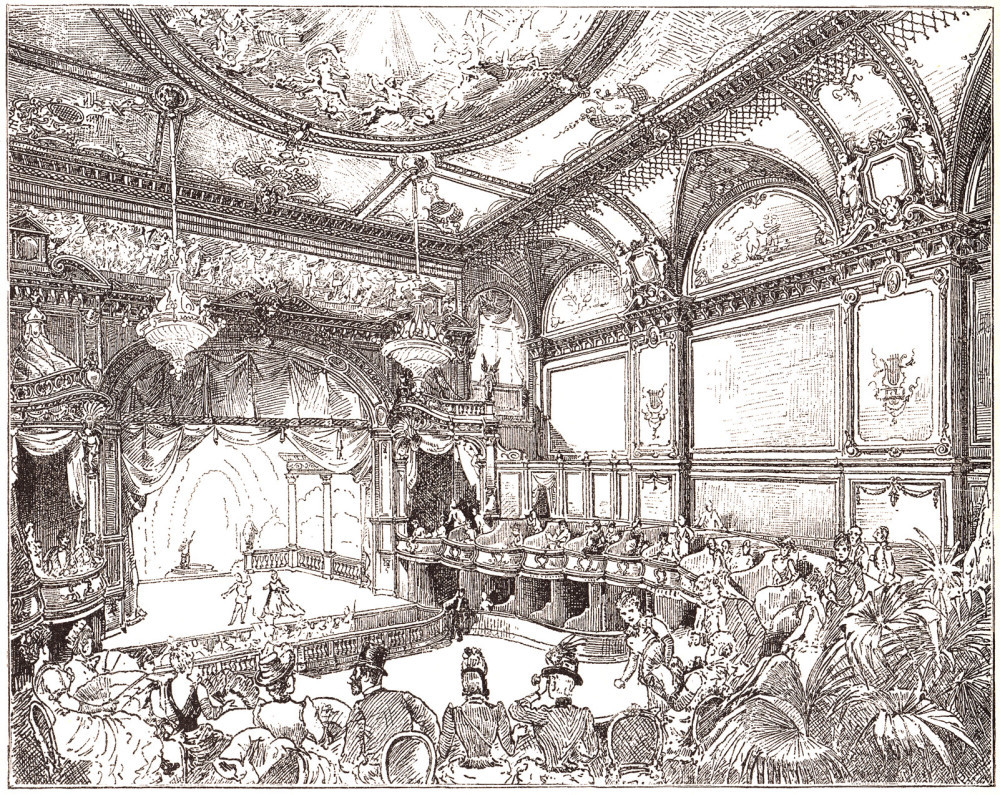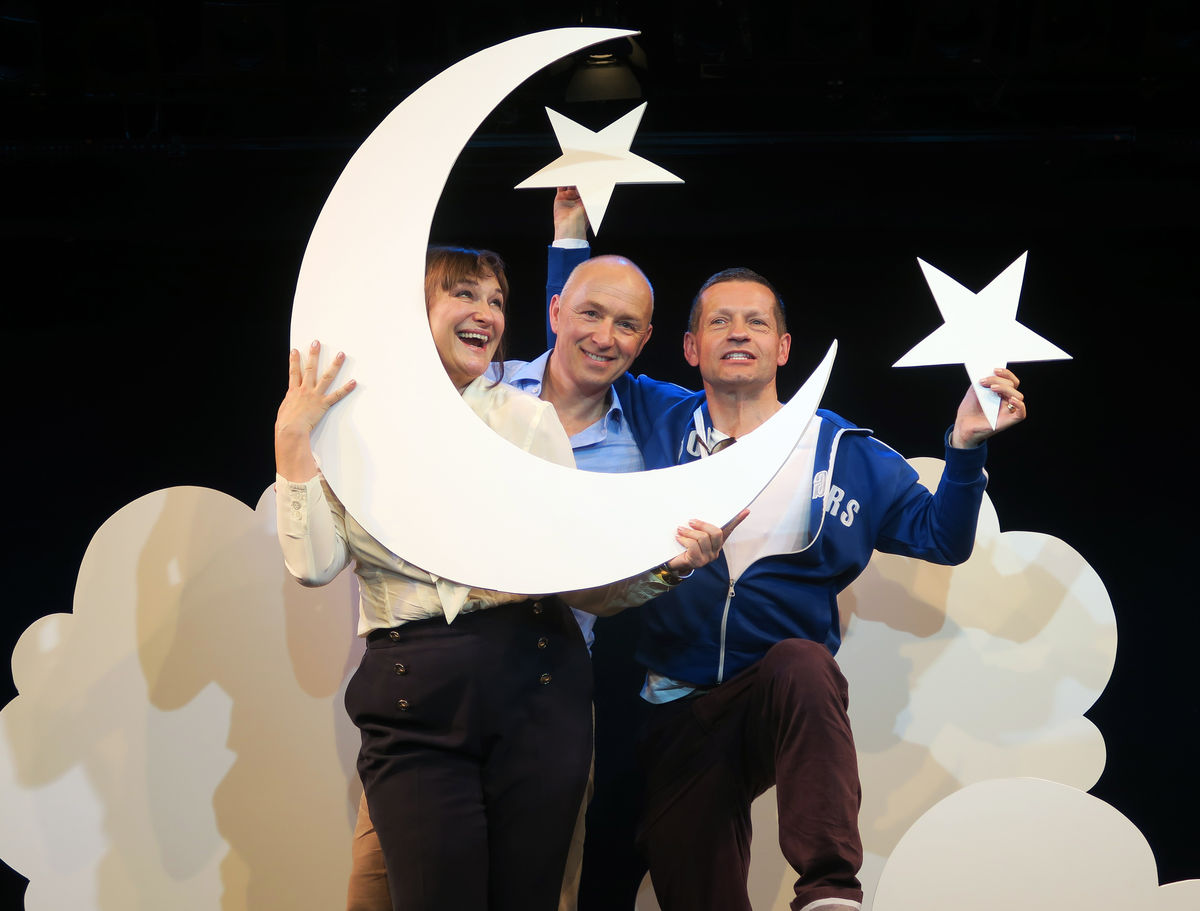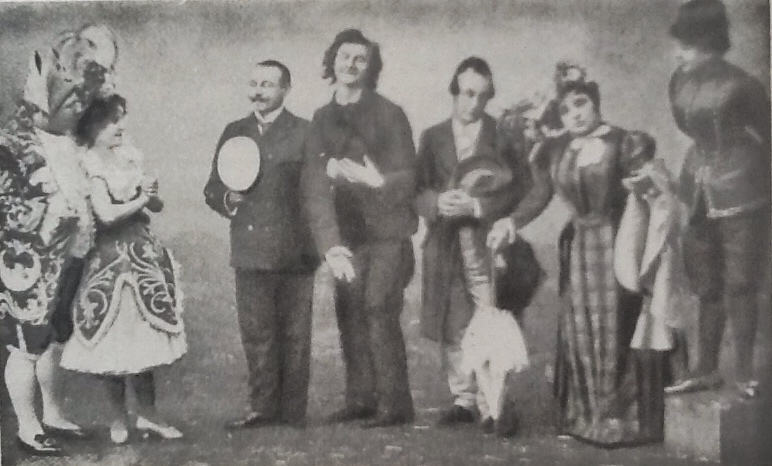Kevin Clarke
Operetta Research Center
18 June, 2016
Most people outside of Germany will probably know Paul Lincke’s 1899 hit show Frau Luna because of the rousing march song “Berliner Luft,” and because Frederick Loewe’s father Edmund Löwe was part of the original cast – he followed Robert Steidl in the male-lead role of Fritz Steppke and was photographed in that role, preserving the memory for eternity (see image at the end of the article). For the rest, few will have heard of this early musical comedy from the then-young German capital. It’s been filmed and recorded many times over, true, but these films and records never circulated internationally; but now the show will return to the stage in a modern all-star version that might attract more attention from outside of Germany.

The entire “Frau Luna” team at the Tipi press conference. (Photo: Xamax)
The original production, back in 1899, premiered at the Apollo Theater at the southern (seedy) end of Berlin’s Friedrichstraße, famous for its prostitutes. The Apollo was a “specialty” theater like American vaudeville venues. There were “Kunstjodler,” acrobats, ballets, magic tricks, chanson presentations …. and short operettas. As long as they all offered lots of girls in scanty skin-colored outfits. One such show was Frau Luna, written by Berlin’s dashing up-and-coming composer Paul Lincke. It’s a comedy about three guys trying to construct of space ship to fly to the moon. The three men live in a house run by the resolute Mrs. Pusebach. She once met a handsome foreigner while taking a nightly stroll around the Siegessäule and immediately fell for his exotic charms. Sadly, he was gone the next morning and never seen again. Cue for Pusebach’s glorious lament “Oh Theophil!”, one of the hit songs of the show.

The interior of the Apollo Theater, a variety theater on Friedrichstraße.
After a fight over unpaid rent, Steppke – one of the three men – falls asleep and dreams of his space ship actually taking off. On board is the entire Berlin crew, including (by accident) Pusebach. When they land on the dark side of the moon, they discover that there is no man in the moon – but a woman: Frau Luna, a glorious goddess with a sexually rather liberated entourage a twinkling (female) “stars.” In the original 1899 production they had their own dance number with a “Luftakrobatin” called Grigolatis at its center. Grigolatis was hardly dressed the way respectable ladies of the late 19th century were expected to dress. But that was the whole point!

The acrobat Grigolatis who lead a flying ballet in “Frau Luna.” (Photo: Stiftung Stadtmuseum Berlin)
Up on the moon, Frau Luna casts a longing eye on Fritz (very much like the Grand-duchesse does with the other operetta Fritz). And Pusebach walks into her long-lost Theophil, who is Luna’s prime minster. He stepped out of line, all those years ago, and ventured down to earth to check out Berlin’s nocturnal scene. And he ended up in Tiergarten, which (today) is a notorious gay cruising area. Seeing Pusebach in plain moonlight, again, gives him a scare, and he has a hard time fighting off her rekindled lust for the jovial gentleman from back then.

The original playbill for “Frau Luna,” 1899.
Amorous chaos follows, especially when the other moon inhabitants walk in and teach the earthlings a thing or two about sexual liberty, in a “no limits” outer space zone: think Barbarella meets vaudeville meets operetta; what Jane Fonda could do in 1968, Robert Steidl, Bianca-Desroches and Maria la Bella could certainly do in 1899.
Because of the original success, the show was soon expanded by its creators Heinrich Bolten-Bäckers (text) and Paul Lincke (music). More songs were added, more scenes, more characters introduced, more opportunities for spectacle invented. Nonetheless, after World War 1 Frau Luna was considered old-fashioned in the midst of the jazz craze of the Twenties. But that made the originally up-to-date show all the more suited for the Nazis who turned it into nostalgic “good old times” mass entertainment – with no “degenerate” syncopations. They presented a new version at the massive Theater des Volkes, which is Erik Charell’s former Großes Schauspielhaus. There was also a successful film version starring Lizzie Waldmüller as Luna, giving a fictional account of the 1899 world-premiere and how the Nazis imagined operetta in its “original” form.
After 1945, many new productions and recordings followed, the march “Berliner Luft” is an evergreen to this very day, performed by every Berlin orchestra at every open-air concert, including the Berlin Philharmonic Orchestra. Also, the haunting “Schlösser die im Monde liegen” song can be heard regularly, sung by sopranos showing off their floating top notes.
Now, Frau Luna returns to Berlin with a very different kind of cast, much closer to the original ideal: a group of cabaret and variety artists will present the show in October 2016 at Berlin’s Tipi, a large tent next to Angela Merkel’s headquarters and across the lawn from the Bundestag building. The goddess of the moon is no chirping soprano of the Ingeborg Hallstein/Erika Köth category, but a feisty Bulgarian called “Fräulein Schneider” (Andreja Schneider) who will definitely teach the earthlings a thing or two about “love.” Schneider is joined by Christoph Marti as a cross-dressed Mrs. Pusebach and Tobias Bonn as her irresistable Theophil. You might remember all three from the successful Clivia production at the Komische Oper; they are also known as the Geschwister Pfister. (Marti was Dolly in Bern’s Hello Dolly.)

The three Geschwister Pfister (Andreja Schneider, Tobias Bonn, Christoph Marti) posing at the “Frau Luna” press conference. (Photo: Xamax)
Add to this stellar cast Ades Zabel as the moon’s groom. Zabel is also a famous cross-dressed personality, known from his Neukölln musicals at BKA (Hostel Hermannstraße). To have him as a master of ceremonies, here, is a special treat. The well-known comedy duo Pigor & Eichhorn is joining the troops too, as is Cora Frost and various other luminaries. Bernd Mottl will direct, after having last presented La Cage aux Folles at the Tipi’s sister venue, the Bar jeder Vernunft. Johannes Roloff will newly arrange the music for an orchestra of 12.
Mottl stated at a press conference this week that the libretto will not be re-written, but kept as it is.
The rumor that the Bolten-Bäckers text is “dusty” and “unplayable” is false: “It always depends on what you do with it, and how you play it!” With a cast like this, it’s pretty certain that the dialogue will either turn into a camp classic, of the highest order, or an eccentric farce: which is what Frau Luna was, to begin with.

Postcard with the original 1899 “Frau Luna” cast at the Apollo Theater.
There are no immediate plans to record the show, neither for CD nor DVD. And no plans have been made for a TV transmission. The show will run from 27 October until 29 January 2017. If it turns out to be a commercial success, Frau Luna will be revived in 2018. You’ll recall that the Tipi’s Kander/Ebb Cabaret production also started small, and was only later turned into an annual “must see” with changing casts. If Frau Luna joins this rotating pattern, there might be a chance for all those other Tipi stars not included in the production to join later, for example Desirée Nick and Gayle Tufts.
In any case, this fully private production is an interesting alternative to the heavily subsidized grand operetta spectacles at the Komische Oper.
We, here at the Operetta Research Center, are very thankful that Berlin offers both options, and we hope that some of the Tipi cast members will soon find their way to the Komische, to join the Geschwister Pfister, Katharine Mehrling, Max Hopp and Dagmar Manzel who have all made the transition.
For more information and performance dates, click here.

The “Luna” cast in 1899, with Edmund Löwe (center) replacing Robert Steidl as Steppke.

OK
hello, i am found of maria la bella, who was a friend of maria vinent, another singer, about whom i ‘m doing an investigation; do you have any kind of document about her? photos etc? best regards sylvie